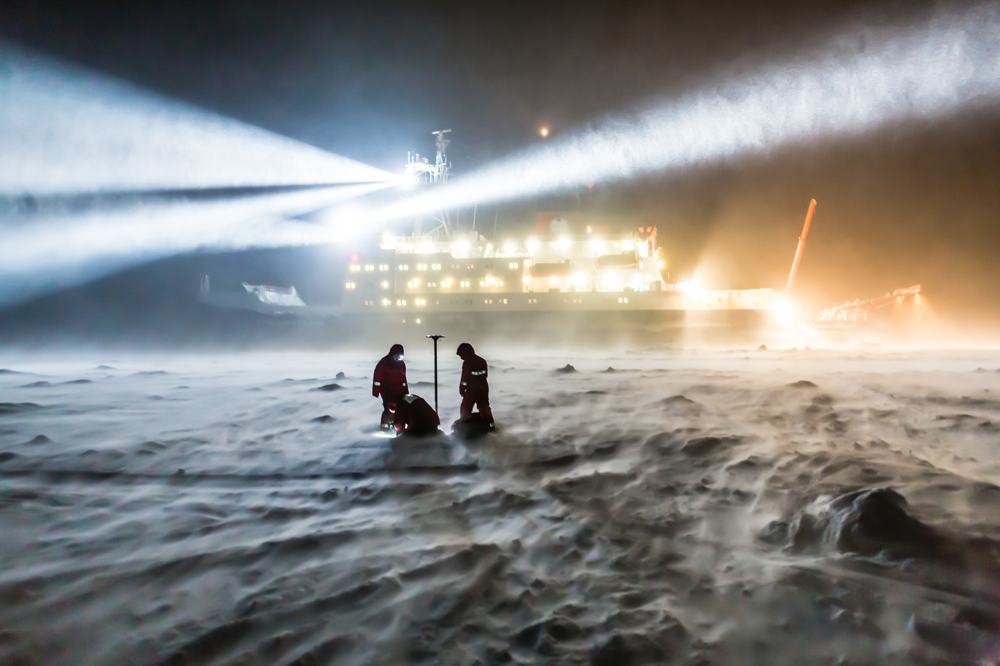Story
Biggest ever Arctic research expedition sets sail
20 September 2019
UK research teams, including scientists from PML, are set to join the first ever year-round expedition into the central Arctic Ocean to undertake ground-breaking studies into the Arctic climate system during the middle of the polar night.

In the largest polar expedition in history, the German research icebreaker RV Polarstern set sail from Tromsø, Norway, on Friday September 20th to spend a year to take the closest look ever at the Arctic as the epicentre of global warming and to gain fundamental insights that are key to better understand global climate change.
During the course of the year seven UK research teams will join hundreds of scientists from 16 other countries including Belgium, Canada, China, Denmark, Finland, France, Germany, Japan, Netherlands, Norway, Poland, Russia, Spain, Sweden, Switzerland and the USA. They will be supported on land by researchers from Austria and South Korea.
The expedition - the Multi-Disciplinary drifting Observatory for the study of Arctic Climate programme (MOSAiC) - will see German research icebreaker ship the RV Polarstern frozen into the growing sea ice, and then follow the Transpolar Drift past the North Pole. In the autumn of 2020, the ship will be released from the ice in the Fram Strait, having followed in the footsteps of Fridtjof Nansen's 1893-1896 expedition on the sailing ship, Fram.
Scientists from 17 countries, including seven UK projects funded by the Government and the Natural Environment Research Council (NERC) will be joining the 12-month international project, which sets sail on 20 September from Norway.
They will conduct an enormous range of marine, atmospheric, biological and other research from the floating platform, field camps and advanced remote and autonomous vehicles. Four other icebreakers as well as aircraft will exchange the crew of around 100 people every two months, as well as resupplying Polarstern with fuel, food and other goods.
One of the projects will be led by PML Plankton Ecologist Dr Angus Atkinson, with Professor Simon Belt of the University of Plymouth. Dr Atkinson said: “We are really excited to be involved with such an ambitious expedition. Polar researchers from around the world are joining forces to understand this unique environment and it is great to be part of this. Our project is using stable chemical markers within the algae – the microscopic plants at the base of the polar food chain. We are using these markers to trace the contribution of the algae living within the sea ice, relative to the algae drifting in the waters below it, in supporting the iconic food web of the Arctic. As ice cover in the Arctic reduces, this balance may shift, so we need to know where the fuel that supports the food web is coming from.”
NERC Executive Chair Professor Duncan Wingham said: “This unprecedented research project offers the opportunity for the UK research teams taking part to make a step-change in in-situ observations and contribute to understanding the regional and global consequences of Arctic change.”
Markus Rex, Head of MOSAiC, Alfred Wegener Institute, Germany: “This mission is ground breaking. Never before has there been such a complex Arctic expedition. For the first time we will be able to measure the climate processes in the Central Arctic in winter. And so for the first time we will be able to understand this region and correctly represent it in climate models. The Arctic is the epicentre of global warming and has already undergone dramatic changes. And it is the weather kitchen for our weather in North America, Europe, and Asia. Extreme weather conditions like outbreaks of cold Arctic air here in winter, or heat waves in summer are linked to the changes in the Arctic. At the same time, the uncertainties in our climate models are nowhere bigger than in the Arctic. There aren’t any reliable prognoses of how the Arctic climate will develop further or what that will mean for our weather. Our mission is to change that.”
The budget for the expedition is roughly 140 million euros. During the course of the year, circa 300 researchers will be on board. Together they will study the entire climate system in the Central Arctic for the first time. They will gather data on five subareas: atmosphere, sea ice, ocean, ecosystems and biogeochemistry, in order to gain insights into the interactions that shape the Arctic climate and life in the Arctic Ocean.
You can find the latest news from the Arctic via the MOSAiC channels on Twitter (@MOSAiCArctic) and on Instagram (@mosaic_expedition) using the hashtags #MOSAiCexpedition, #Arctic and #icedrift. There is more information on the expedition at: www.mosaic-expedition.org. The MOSAiC web app allows you to follow Polarstern’s drift route live: follow.mosaic-expedition.org.
Related information
- Seven UK research teams, including scientists from PML, set to join first ever year-round expedition into the central Arctic ocean
- Vessel will be frozen into the Arctic sea ice then drift across the top of the Arctic Ocean
- Scientists from 17 countries to undertake ground-breaking studies into the Arctic climate system and help take climate research to a completely new level
The seven UK projects are:
- Quantifying the contribution of sympagic versus pelagic diatoms to Arctic food webs and biogeochemical fluxes, led by Dr Angus Atkinson, Plymouth Marine Laboratory, and Professor Simon Belt, University of Plymouth
- Boundary Layer project, led by Professor Ian Brooks, National Centre for Atmospheric Science, University of Leeds
- Floe-scale observation and quantification of Arctic sea ice breakup and floe size during the autumn-to-summer transition, led by Dr Phil Hwang, University of Huddersfield
- Sea Ice Microbiology and the role in cycling of sulphur, led by Dr Hendrik Schafer, University of Warwick
- Sea Salt Aerosol above Arctic Sea Ice – sources, processes and climate impacts, led by Dr Markus Frey, British Antarctic Survey
- Seasonal Evolution, led by Professor Julienne Stroeve, University College London
- Seasonable Carbon Uptake, led by Dr Dorothee Bakker, University of East Anglia